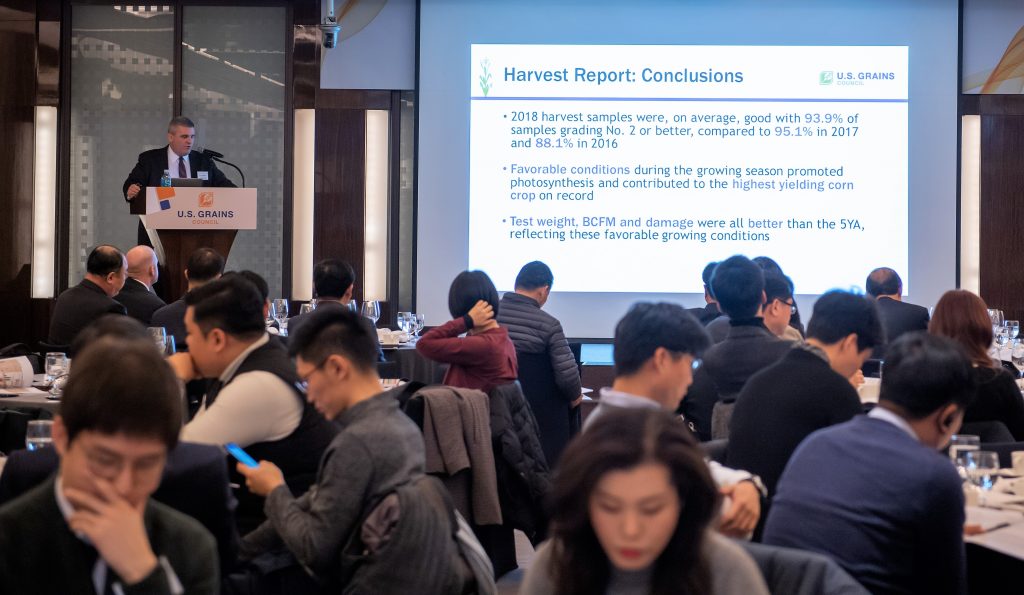Top U.S. Grains Council (USGC) officials are in South Korea and Japan this week, meeting with food and feed grain importers to report on the quality of the latest U.S. corn crop as part of a global series of events focused on U.S. corn, their related products and ethanol.
USGC Chairman Jim Stitzlein and USGC Board Secretary/Treasurer Jim Raben, who are leading the corn quality rollout efforts in Japan, along with Tommy Hamamoto, USGC’s Japan director; Tim Tierney, USGC director of strategic marketing/ethanol, North Asia; Scott Winslow, vice chair of the Minnesota Corn Research and Promotion Council and USGC Trade Policy A-Team member; and Tom Durand, president, Corn Marketing Program of Michigan are meeting with grain buyers and discussing the status of this year’s U.S. corn crop.
Cary Sifferath, USGC senior director of global programs, also participated in the meetings and visited with Korean officials this week, along with Haksoo Kim, USGC director in Korea, and Brian Kreps, Michigan Corn Growers Association board member.
“Explaining quality aspects of this year’s corn crop in these two long-term and loyal markets is of utmost importance to us and part of our trade servicing mission at the Council,” said Stitzlein. “We want to thank our Korean and Japanese importer friends for continuing to show their confidence in the U.S. corn crop, and we also want to discuss future of purchases with our partners in these countries.”
Both South Korea and Japan are longtime hosts to the Council’s market development programs, where Council staff and members have developed close and fruitful relationships that drive corn and co-product sales.
In 2018, Japan was the second largest global purchaser of grains in all forms (GIAF), second largest global buyer of U.S. corn and sorghum, the #3 global buyer of U.S. barley and ninth largest buyer of U.S. distiller’s dried grains with solubles (DDGS).
South Korea was the second largest buyer of U.S. DDGS in 2017/2018 in addition to the third largest buyer of U.S. corn and sixth largest buyer of U.S. ethanol.
While in Korea, the group met with the leaders of two compound feed companies at two different 2018/2019 Corn Quality Seminars – one in Seoul and the other in Busan. To address interest in the 2018 U.S. corn crop, Sifferath discussed findings from the quality report with a focus on the low levels of broken corn/foreign matter (BCFM) and mycotoxins, pesticide treatments during the growing season, and how producers manage risk under current market dynamics. As a means of promoting the product, Kreps’ presentation featured his farming operation, allowing potential buyers to hear from a U.S. farmer’s perspective how this year’s corn quality stacks up, and Kim offered the market outlook for the coming year.
In Japan, the delegation participated in a corn outlook conference, a mix of meetings with U.S. and Japanese government officials and two different Japanese trade associations.
The group met with the Ministry of Economy, Trade and Industry (METI) to express appreciation for its new biofuels policy that will allow U.S. corn-based ethanol for the first time.
Still in country, the U.S. delegation is set to meet with the Ministry of Agriculture, Forestry and Fisheries later this week to exchange opinions and information on the feed grains market and outlook in Japan, especially surrounding the coming U.S.-Japan trade negotiations.
Japan is a mature and stable market for U.S. feed grains, and both the USGC and its Japan office have contributed to the rapid growth of the local livestock and feed industries, helping increase sales of U.S. feed grain imports. Japan is now considering use of biofuels like ethanol as a tool to meet its greenhouse gas emissions reduction commitments.
“With the policy changes under consideration, Japan is poised to break into the top 10 list of countries importing U.S. ethanol,” Raben said. “The Council is engaged in this work by helping the Japanese find the information they need to include U.S. corn-based ethanol in the Japanese energy policy and as an approved source for ethanol in the Japanese fuel market.”
For more information on the Council’s work in South Korea, check here.
For more information on the Council’s work in Japan, check here.
About The U.S. Grains Council
The U.S. Grains Council develops export markets for U.S. barley, corn, sorghum and related products including distiller’s dried grains with solubles (DDGS) and ethanol. With full-time presence in 28 locations, the Council operates programs in more than 50 countries and the European Union. The Council believes exports are vital to global economic development and to U.S. agriculture’s profitability. Detailed information about the Council and its programs is online at www.grains.org.

